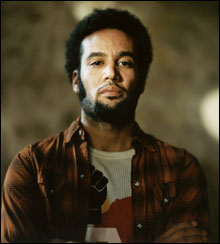 “Living these days is makin’ me nervous,” Ben Harper sings at the start of the title tune of his new Both Sides of the Gun (Virgin). And the guitarist and singer-songwriter isn’t alone.
“Living these days is makin’ me nervous,” Ben Harper sings at the start of the title tune of his new Both Sides of the Gun (Virgin). And the guitarist and singer-songwriter isn’t alone.
Like many artists who haven’t previously been associated with protest music, including Tom Waits, Green Day, and bluesman Robert Cray, Harper has been polarized by the world’s jittery state. The swirl of poverty, racism, nationalism, imperialism — you name the divisive ’ism and chances are we’re living it — resonate through many of his new songs. And in “Both Sides of the Gun,” he draws a bead on the sense of disenfranchisement many rational Americans are suffering. “I feel like I’m crowded/I can’t get out,” he sings in the second verse. “World keeps on filling me up with doubt/When you’re trapped you’ve got no voice/When you want you got no choice/Other than to take you some/It’s tension/Too much to mention/When you’ve livin’ on both sides of the gun.”
“Social change and social justice have never been handed down to any generation, culture, or era,” he suggests when I reach him by phone on a tour stop in Florida. “It always must be demanded and fought for, so I don’t expect that to be any different now. World events, Katrina included, all seem to be pushing us more toward demanding justice. But my fear is, if Americans aren’t taking to the streets for this administration and its actions, what are they going to be in the streets for?”
We talk about the loaded imagery of his album’s title. The pilings of the United States were driven into the ground with gunpowder, so guns have a potent and ongoing role in our history and culture, right up to the current war in Iraq and the growing street violence in Boston and other cities. “If we don’t want people shooting each other, or at helicopters, we need to put some money into managing handguns. Or if we don’t want people shooting at helicopters from rooftops, maybe they should pick people up when they’re starving and their lives are threatened instead of flying past them.”
That’s a reference to New Orleans. Both Sides of the Gun’s “Black Rain” is sparked by the devastation of the Crescent City and the federal negligence that compounded it. By the time the tune ends, Harper is predicting nothing short of revolution, or at least the overthrow of the current political power structure that’s betrayed the American trust. “Something of the magnitude of Katrina really pushes things toward civil unrest for a lot of reasons — civil rights, economic empowerment. I think there’s a lot of rage in the wake of Katrina that’s eventually going to be channeled somewhere, which is only natural in the face of that kind of blindness to the values of human lives.”